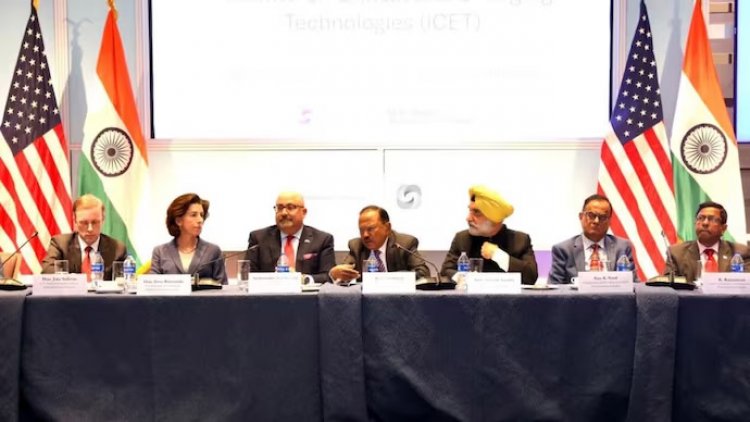India, US NSAs Discuss Ways to Jointly Push Critical Tech
Asia News Agency

India's National Security Advisor Ajit Doval participated in a round table discussion with his American counterpart Jake Sullivan and US secretary of commerce Gina Raimondo on Jan. 30, hosted by the US-India Business Council (USIBC) at the US Chamber of Commerce, with an aim to promote development of critical technologies such as quantum computing and artificial intelligence amid China’s rapid progress in these sectors.
At the USIBC meet Doval highlighted the need to convert intentions and ideas into actions and specific deliverables through focused steps in a time bound manner, according to Indian government officials.
Announced during US President Joe Biden and Prime Minister Narendra Modi’s bilateral talks in Tokyo in May 2022, the ICET is spearheaded by the National Security Councils of both countries and focuses on strengthening the US-India partnership on the technologies that will drive global growth, bolster both countries’ economic competitiveness and protect shared national security interests.
In support of the ICET, the US Chamber of Commerce held the round table with industry executives across the spectrum of advanced technologies, including semiconductor design and manufacturing, commercial electronics, advanced telecommunications, commercial space, aerospace and defence, and information technology services. Leadership from academia and venture capital firms also participated.
USIBC head Atul Keshap said in his welcome remarks that “the US and India are not only Quad partners, but members of a high-trust ecosystem underpinned by converging interests and shared values”.
“The ICET is a tremendous forum for our two democracies to coordinate on sustaining a free, open and secure global economy that can ensure the future happiness of humanity,” said Keshap, adding that “both governments convening the ICET with such a strong industry presence at the US Chamber of Commerce demonstrates their recognition that business plays an essential role in bolstering the security and prosperity of both nations”.
Raimondo highlighted the central role the US and India would play in shaping the development of advanced technologies.Round-table participants discussed opportunities to promote development of critical and emerging technologies such as quantum computing and artificial intelligence, with a special focus on how to increase academic and government research exchanges and strengthen their linkages with the private sector.
A key theme was how both governments could facilitate deeper alignment on technology issues, including encouraging semiconductor supply chain resilience, deepening the two countries' research and development collaboration, strengthening workforce and education connectivity, and promoting co-investment and co-development.
Addressing industry executives, Sullivan said, “ICET is about much more than technology cooperation. It's a platform to accelerate our strategic convergence and policy alignment.” Highlighting the work ahead for both governments, he said the US and India “want to establish a list of firsts – firsts in removing barriers, on both sides, to enable greater ambition by all of you.”
Sullivan said the ICET will accelerate the US’ strategic technology partnership with India and advance the shared democratic values. He also recognised the pivotal role that businesses, educators and investors play, urged attendees to be ambitious in deepening business and academic ties, and committed to working with Doval to remove barriers on both sides.
Doval and India’s ambassador to the US, Taranjit Singh Sandhu, highlighted India’s remarkable capacity for technology development and absorption, and emphasised India’s use of technology not only as an enabler of economic growth but as an instrument of social inclusion.
Both officials commended the launch of the ICET, given the natural complementary strengths of the Indian and American economies and the growing strategic convergence between both nations. Both also emphasised India’s growing role as a trusted supply chain partner and contributor in the global technology value chain, and underlined the importance of easing export control measures to facilitate technology access, co-production and co-development between India and the US. In one of the sessions, they discussed microchips as a critical technology and the important role the bilateral relationship could play in building a reliable semiconductor supply chain.
Other discussion topics included defence and space technology, and the participants underlined the importance of greater cooperation between government, industry and academia to build a stronger innovation ecosystem that supports American and Indian competitiveness in both traditional and novel defence domains.
The participants also discussed the critical value that startups and venture capital investors play in accelerating innovation and commercialisation of new technologies. Industry representatives said a shared resolve to facilitate the movement of highly skilled workers and scientific personnel, as well as to ease export control measures and protect intellectual property frameworks, would be key to strengthening the US-India innovation ecosystem.
Doval was accompanied by a delegation including India’s principal scientific adviser, ISRO chairman, scientific adviser to the defence minister, secretary of the Department of Telecommunications and director general of the Defence Research Development Organisation.
From the US side, besides Sullivan, secretary of commerce Gina Raimondo, National Security Council coordinator for the Indo-Pacific Kurt Campbell, senior director for national security and technology Tarun Chhabra and State Department’s deputy envoy for the office of critical and emerging technologies Seth Center will be part of the dialogue.
The ICET was first mentioned in a statement after a meeting between Modi and Biden in Tokyo in 2022 on the sidelines of the Quad Leaders Summit.
(Courtesy: Defence.Capital)
















